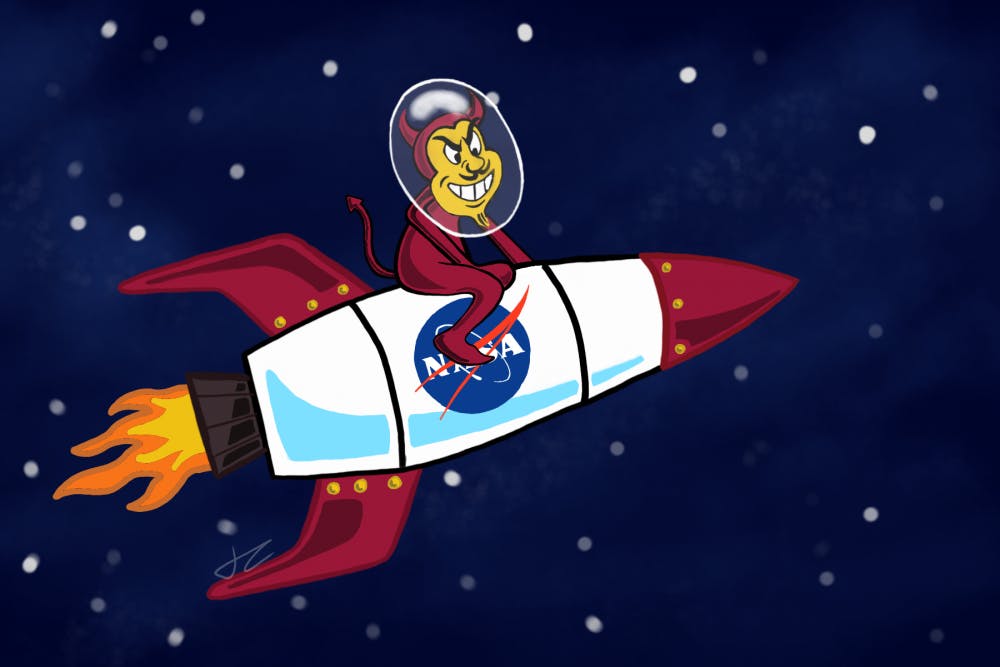The SpaceX Falcon 9 rocket, the first of its kind capable of reentry into the Earth’s atmosphere, shot across Southwestern night skies on Dec. 22, 2017, leaving many people vexed.
Some believed it was a UFO, marking the beginning of a new age of alien descent upon humanity. Others did not draw any conclusions about it, opting to simply make memes about the sighting instead.
In an age where space travel is rapidly advancing, the lack of awareness toward the field of aerospace should be less of a norm than it currently is.
The aerospace engineering program at ASU is shockingly small, comprising only about 4 percent of the total number of undergraduate students enrolled in the Ira A. Fulton Schools of Engineering in Fall 2017. This is compared to the nearly 10 percent of engineering students enrolled in mechanical engineering.
Astronautics, as a field, appears abstract in more ways than just the physical — rocket science appears to be a literal shot in the dark, and it often seems as though research towards space technology has virtually no immediate effects on day-to-day life.
However, while aerospace research does aim to achieve the long-term goals of commercial space travel, there are also much more tangible applications of aerospace innovations to the lives of the everyday individual and should be more ubiquitously known.
Research conducted by faculty at ASU involves a variety of fields, including defense technology, climate prediction, renewable energy and turbulence on airplanes, impacting more fields than just aviation.
Valana Wells, the undergraduate program chair for aerospace and mechanical engineering at the School for Engineering of Matter, Transport & Energy, explained the necessity of aerospace research.
“There are so many reasons why (aerospace) is important,” Wells said. “There’s the obvious ones, such as getting people from place to place and getting things from place to place, and clearly there’s a military aspect of aerospace, which involves both air and space.”
There is also another commonly overlooked application of aerospace technology that lies within the palms and pockets of a majority of people today: cellphones.
“Space is also extremely important for just your phone, as telecommunications are done through satellites,” Wells said. “There are also lightweight materials used in cars, and guess what — aerospace (engineering) developed that material, and now you can use that for other applications.”
Advancements in technology can be found locally both at and around ASU. Iridium, a satellite communications company operating in Tempe, applied aerospace technology to improve global connectivity for smartphones. Yet, such advancements are rarely recognized by today's generation of students.
Aerospace is also a thriving field, projected to grow by 6 percent by the year 2026, meaning that the students of today will be responsible for the innovations of the future.
“For the future, it’s going to be an interaction between all the different disciplines,” Wells said. “The needs of one drives another, and you see that in all different applications. But if the education is a good one, we emphasize that you can’t do this by yourself. We’re all interacting with each other.”
From commercial air and space travel to cellular usage, the research and development conducted in both aeronautical and astronautical engineering affects the lives of every individual and deserve more recognition not only among students at a research institution such as ASU, but also among society.
Reach the columnist at kalbal@asu.edu or follow @KarishmaAlbal on Twitter.
Editor’s note: The opinions presented in this column are the author’s and do not imply any endorsement from The State Press or its editors.
Want to join the conversation? Send an email to opiniondesk.statepress@gmail.com. Keep letters under 500 words and be sure to include your university affiliation. Anonymity will not be granted.
Like The State Press on Facebook and follow @statepress on Twitter.




